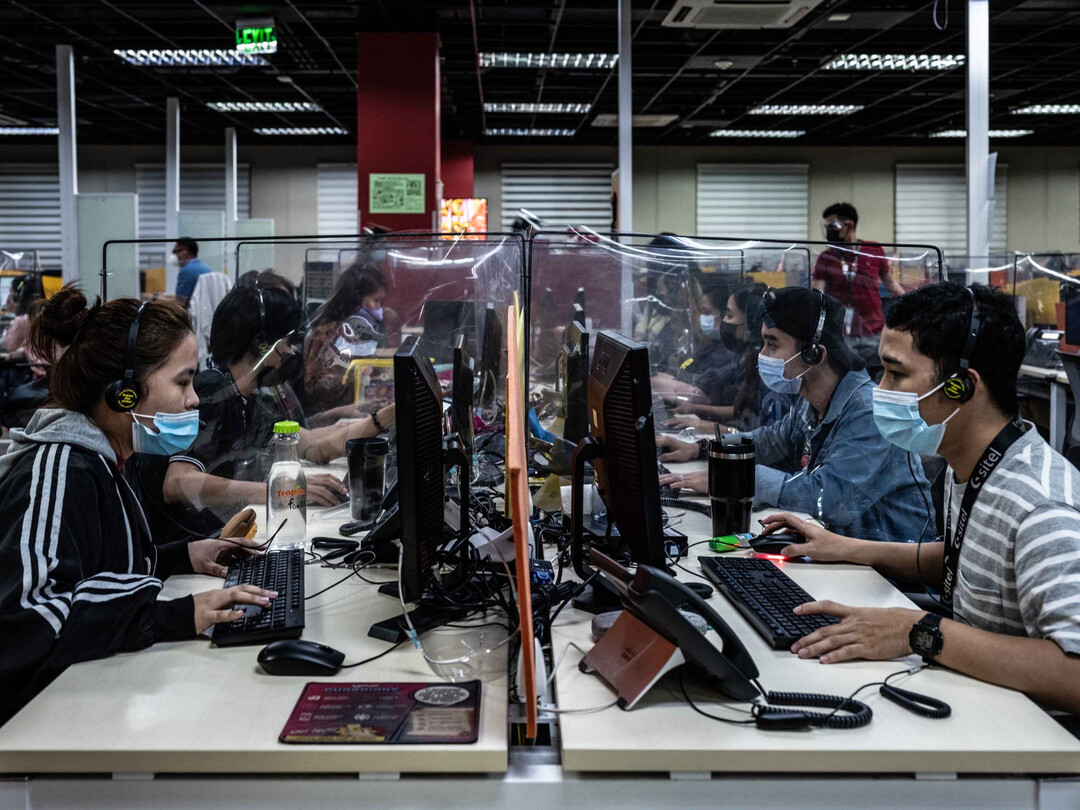
Manila, Philippines – A corporate event awash in bubbles, complete with dazzling lights and loud music, a so-called ‘foam party’ alongside colleagues might seem a rather extravagant way to boost employee morale. But for KMC Solutions, one of the Philippines’ leading outsourcing providers, it’s part of an increasingly crucial strategy to attract and retain its often-volatile workforce.
Long known as the “call center capital of the world,” the Philippines’ outsourcing firms have typically been associated with thin margins and high employee turnover. Now, they are striving to climb the value-added chain by hiring skilled tech professionals, such as software developers or data analysts, whose salaries and day-to-day work are dictated by the client company, not the outsourcing provider.
“Before, clients would just want a certain number of heads answering the phone, and they wouldn’t know how much the provider was paying the employee, or even who the employee was,” explains Gian Reyes, KMC Solutions’ head of marketing. But now, KMC faces the challenge of integrating and motivating teams working remotely thousands of miles from their client’s headquarters. Recruiting talent in new tech fields, where demand far outstrips supply, is even tougher.
This trend has been a boon for KMC, which has seen its outsourced headcount quadruple since 2020, and its revenues rise from $69.6mn to $82mn. KMC acts as the legal employer, handling payroll and compliance in exchange for a monthly fee. The outsourced employees work integrated into the client’s operations. “With this shift, companies are looking for impactful talent — people who will make a difference, who they want to train, and who will still report to them,” Reyes says.
FT Asia-Pacific High-Growth Company
As part of its efforts to boost camaraderie and retention, KMC offers foam parties and free ice cream every Friday, as well as an annual raffle with Vespa scooters and cars as prizes. Outsource-IT, a Manila-based competitor ranked 317th in the FT/Statista list, held an online singing contest on Valentine’s Day that drew participation from 70% of its 400 outsourced employees, the majority of whom are fully remote. “Our mission is twofold: find the best talent and make them stay forever,” emphasizes Mike Larcher, Outsource-IT’s chief executive.
KMC and Outsource-IT are among a plethora of companies helping multinational corporations tap into the skilled Filipino talent pool as Western societies grapple with tech shortages and aging workforces. The Philippines’ median age is 26, significantly younger than the US’s 39, according to official figures. The average monthly salary in the Philippines was PHP18,423 ($339) in 2022, according to the Philippine Statistics Authority, compared with the US Bureau of Labor Statistics’ figure of $4,588 for the same year.
KMC’s main clients are US and Australian companies, including e-commerce, fintech, and cloud-based software firms like Zoom, which employs around 1,000 staff through KMC. This trend marks a significant departure from the call center-centric image of the Philippines, which began in the 1990s as US companies looked to the country for its high English proficiency and neutral accent. Today, the Philippines still outranks Switzerland and Spain in English proficiency, according to education provider EF.
Now, Outsource-IT and KMC are seeing increasing client demand for a much wider range of roles. “People are starting to realize that anything can be outsourced offshore,” says Larcher. “We’re seeing demand in virtually every industry — architects, estimators, legal assistants, accountants.”
Growth in the Philippines’ Business Process Management (BPM) Sector
The Philippines’ BPM sector employed 1.8mn people in 2024, and the IT and Business Process Association of the Philippines (IBPAP) forecasts this number will rise to 2.5mn by 2028. “We need to move beyond the initial phase of English proficiency, communication skills. Those are givens, and they got us here,” says Jack Madrid, IBPAP’s president. “We need to double down and speed up on addressing the talent issue.” The former MTV Philippines president is trying to pivot the country from a low-cost, back-office processing hub to a provider of high-value talent embracing artificial intelligence and the digital economy. “We need to leverage our demographic sweet spot, and the way to do that is not just counting heads, but moving up the value chain by focusing on revenue per employee,” he adds.
But industry leaders acknowledge a skills gap. Angela Rux, business development director at Booth & Partners, ranked 133rd and focused on “employer of record” services, says it is “frustrating” to sometimes turn down AI-related contracts due to a lack of qualified personnel. “It would be nice if there were programs where people could easily upskill… Right now, our education system lacks that,” she notes.
Ronald Mendoza, undersecretary for strategic management at the Philippines’ Department of Education, says “bold” government reforms in education and training are on the way, but adds that these efforts will “rely on strong partnerships with the private sector” to secure the necessary resources.
Outsourcing firms are experimenting with in-house training programs as they try to make working for them a stable and upwardly mobile career choice. Rux says the average tenure of an outsourced employee at Booth & Partners is three years, compared with an industry average of 12 months.
Reyes believes the booming BPM sector could reverse the Philippines’ long history of workers going abroad and sending remittances home. “We’re seeing less people wanting to move overseas and leave their families because they can find decent-paying jobs here in the Philippines,” he says.
Madrid adds that multinational companies also need to consider how they communicate with their outsourced staff, emphasizing the value and impact of their work. He recalls when JP Morgan Chase chief executive Jamie Dimon visited the Philippines, where the bank employs 20,000 people. “It was like the return of a king,” he says. “[Dimon] said the Philippines is the third-largest country for JP Morgan. That’s a good example of how corporate culture and brand should be communicated.”
[Copyright (c) Global Economic Times. All Rights Reserved.]




























